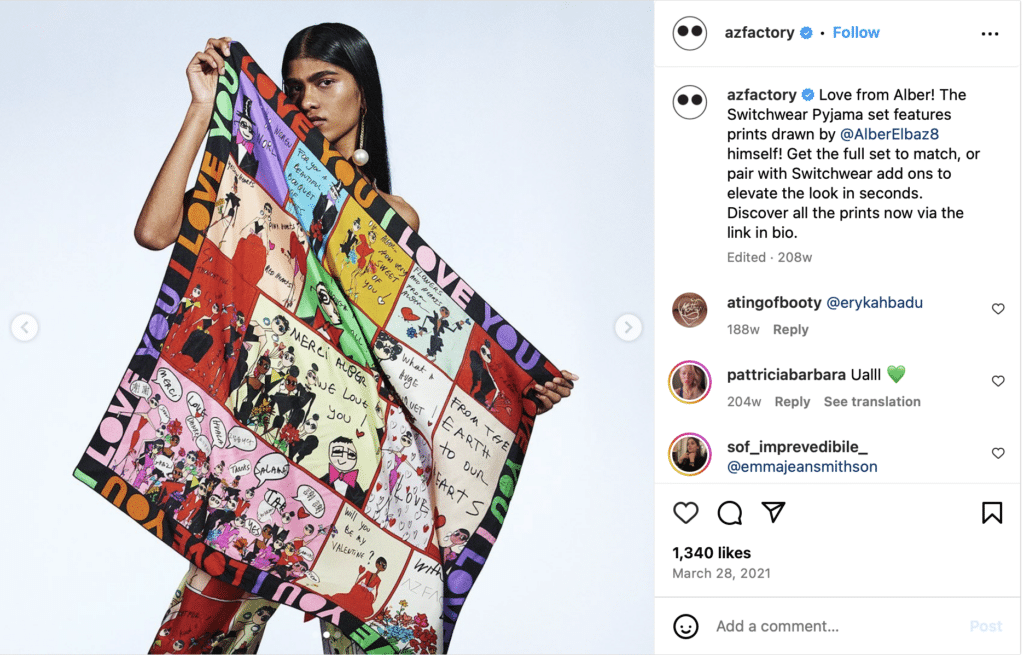A French court has ruled in favor of AZ Factory in a newly issued decision over copyright-protected patterns, placing notable emphasis on the brand’s use of blockchain timestamps to prove ownership. In a ruling on March 20, the Tribunal Judiciaire de Marseille sided with AZ Factory, finding that the Richemont-owned fashion brand launched by the late Alber Elbaz successfully demonstrated authorship and copyright ownership of two prints created by Elbaz and infringement of those prints by a fashion wholesale company, which was offering up garments featuring copycat prints without authorization.
The Background in Brief: AZ Factory filed suit against S.A.R.L. Valeria Moda back in 2022, alleging that the French wholesaler was selling garments featuring infringing versions of its signature “Love from Alber” and “Hearts from Alber” patterns. These silk pieces – featuring Elbaz’s cartoon-style self-portraits and colorful hearts – have become emblematic of the designer’s posthumous legacy and were central to the brand’s 2021 “Love Brings Love” tribute collection, AZ Factory argued.
A Relatively Straightforward Copyright Case
Siding with AZ Factory, the Tribunal Judiciaire of Marseille primarily acknowledged the company’s rights in the “Love from Alber” and “Hearts from Alber” designs, stating that their originality (a central requirement for copyright protection) was “not in dispute,” as it stems from the artistic and aesthetic choices of Mr. Elbaz. With that in mind, the court stated that Valeria Moda had commercialized near-exact versions of the protected designs (albeit with lower-quality materials and sold at significantly reduced prices), thereby, engaging in copyright infringement and damaging AZ Factory from a moral rights perspective.

The court ordered Valeria Moda to pay €11,900 in damages (€1,900 for economic losses suffered by AZ Factory and €10,000 for moral damages), as well as €3,500 in legal fees. The court also issued an injunction mandating that Valeria Moda immediately and permanently refrain from manufacturing, marketing, and/or selling any products that would infringe AZ Factory’s rights and destroy all infringing garments in its possession or stock within 15 days of the judgment becoming final.
And finally, the court required Valeria Moda to pay for the publication of the judgment against it in three professional journals under the heading “JUDICIAL CONDEMNATION.”
Originality, Ownership & the Role of Blockchain
The standout element of this otherwise straightforward copyright infringement case stems from AZ Factory’s use of blockchain technology to timestamp and anchor digital fingerprints of Elbaz’s original sketches – an approach the court deemed both legitimate and compelling. AZ Factory created timestamped records of the original “Love from Alber” and “Hearts from Alber” designs. Specifically, the company anchored the digital fingerprints (hashes) of Elbaz’s original sketches and drawings that appear on the garments onto the blockchain back in 2021 using BlockchainyourIP, an intellectual property protection service that uses blockchain technology to timestamp and anchor digital files in a tamper-proof and time-stamped ledger.
In the proceedings at hand, AZ Factory used the blockchain hosted records to support its copyright infringement claim (in lieu of copyright registrations) by demonstrating the contested designs were not only original but were also created and owned by AZ Factory well before the alleged infringement occurred.
THE BIGGER PICTURE: The district court’s ruling affirms the growing legitimacy of blockchain as a tool for creators to assert and defend intellectual property rights in a rapidly evolving – and increasingly digital – industry. The outcome also appears to demonstrate how blockchain tech can act as a supplement to – or depending on the jurisdiction, a replacement for – traditional copyright registration systems, which could be particularly useful in industries like fashion where rapid copying often precedes formal registration.
Reflecting on the outcome, Vincent Fauchoux, a lawyer at the DDG law firm in Paris, who represented AZ Factory, told TFL, “This decision carries exceptional symbolic significance for two reasons. First, it is a form of judicial tribute to the exceptional talent of Mr. Alber Elbaz, who passed away during the COVID pandemic. Second – and most importantly – it is the first decision in France, and possibly in Europe, to order a condemnation for infringement based on digital proof of the counterfeit creations secured via blockchain. The technology was developed by a French start-up called BlockchainyourIP, which has created an innovative solution now adopted by major global luxury groups.”
The case is AZ Factory v. S.A.R.L. Valeria Moda, Tribunal Judiciaire de Marseille, 20 March 2025.














